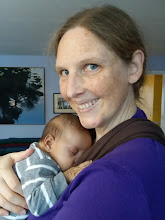Saturday afternoon with crocodile
What do tropical ecologists do for fun on a Saturday afternoon? Well, if it happens to be a bright and pleasant Saturday like today, with the river low and the thunderheads stacked up but not yet spilling over in the slow hot hour after lunch, tropical ecologists are known to go crocodile hunting.
Dennis, aka Señor Culebra, was our guide on the croc hunting expedition. He’s a herpetologist whose research involves capturing fer-de-lances (the most dangerous snake in Central America, fatalities-wise) and surgically implanting radios into them so he can track their movement patterns in the field. He’s been at La Selva for nearly two years now, enough to warp anybody—though, like the rest of us, I imagine Dennis was somewhat warped even before he got here.
Before last year, crocodiles hadn’t been seen at La Selva since the early 90s. There used to be a tradition of floating down the river on truck inner tubes, from the abandoned house on the Sendero Oriental to the River Station. Well, Dennis and Marcía went floating last summer, on a hot, bright afternoon not unlike today, and they came around a bend in the river next to the place traditionally called Crocodile Beach. Dennis said he heard Marcía shouting something. He looked up just in time to see the rear end of a giant crocodile sliding into the murky water perhaps twenty meters away. They swam like hell for the bank and walked back to the station. Floating has been curtailed considerably since then.
Through some gap in my education, I mistakenly believed that crocodiles were exclusively found in the Old World. But there are actually four crocodilian species in the New World: the giant Orinoco crocodile (Crocodylus intermedius), two smaller Carribean species (C. moreletii and C. rhombifer), and the one that concerns us here, the American crocodile (C. acutus). Found from South America all the way up to Florida, they can grow to more than three meters long (and as Dennis said, indicating the girth with both arms, “too big for me to hug.”)
After lunch this afternoon, Dennis led us (me and a few other students and researchers) across the yard of the family houses at the far edge of the station, over a barbed wire fence, and across a muddy pasture. At the edge of the trees by the river, he halted. “You’ve got to be quiet,” he warned. “He may be a giant three-meter crocodile, but he’s a sissy. If you’re too loud, he’s outta there... Good, no cows on the beach. I think he’s scared of cows, too.” He went ahead, and then looked back with the unmistakable grin of a herpetologist who’s just sighted something large, fierce, and capable of doing him in. He beckoned to us.
I didn’t see it at first. And then, on the far bank, a shape materialized against the contours of gray sand and brown-green water. Scaly, broad, enormous, the exact color of the silt-laden river, he lay on the bank halfway out of the water. I was very happy to be on the opposite side of the river. He was at least three meters long—and quick, too. One of us made a sound, and the crocodile looked up towards us, lurched forward, and vanished beneath the water with barely a ripple.
Sara and I had been planning to go swimming this afternoon (at Playa Zampopa, a good kilometer downriver from crocodile beach). But after our close encounter, and after hearing that the croc had been sighted a few times at Zampopa as well, suddenly the water wasn’t quite so attractive. We contented ourselves with throwing rotten guavas to the machacas, frugivorous fish that are cousins to piranhas. A large school of them near the suspension bridge makes the water boil when you toss down any likely-looking scrap.
So next time you wonder what the tropical ecologists are up to on a Saturday afternoon, you’ll have the answer. Actually, most Saturdays we are engaged in much less pleasant activities, such as data entry or—my job for the rest of this afternoon—cleaning the office. And the lucky few of us, such as myself, who flew American Airlines recently, are also engaged in the task of trying to reach Baggage Services and find out whether our bags are even in the country yet...


0 Comments:
Post a Comment
<< Home